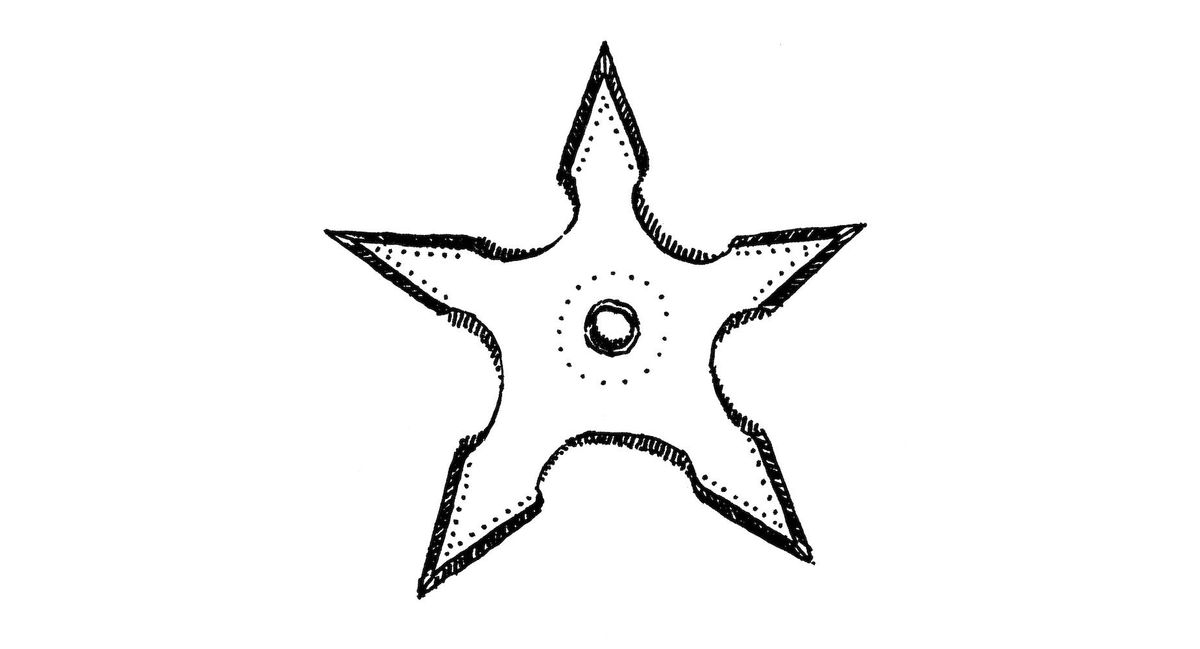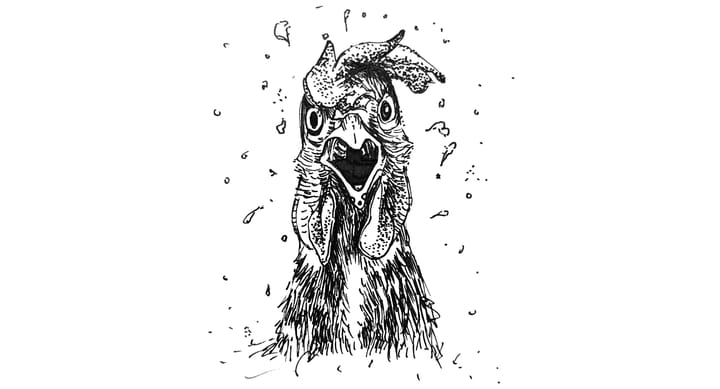One dozen shuriken, plus a crossbow
It’s impossible to truly know what you’re getting yourself into with a new job

When I dropped out of design school in my twenties and was unemployed in Whanganui, I would wander about half-heartedly looking for a job. A place called The Crystal Palace had a HELP WANTED ad in their window, written in felt tip pen. I took a look around the shop. They sold incense, tie-dyed shirts, pipes, crystals, pewter dragons, flowing sorceress dresses, and weapons – mostly steel knives and swords. I didn’t like the idea of suffocating in the scented cloud that clung to the incense rack, but aside from that, it seemed like a straightforward store-clerk job. Take the dollars, hand over the things.
“You’ll also need to handle the bookings for people wanting to see the clairvoyant or to get piercings,” said the mother, Augusta, who was interviewing me with her daughter, Megan. Augusta had huge, watery eyes that seemed to be x-raying me for flaws. Megan just stared out the open store door at the sun on the street outside.
“Okay,” I said, casting my eye over the laminated photos of the various available piercings. They were poorly shot, which made it look like they’d been done in an alleyway.
I was to start the next day. I paused for a moment, wondering if perhaps they might offer me a contract to sign. They did not.
The store only had three CDs, which played on a loop: Fleetwood Mac – Greatest hits; Odyssey Number Five, by Powderfinger; and some miscellaneous album by Richard Ashcroft, grumbling away (perhaps still irked that his biggest hit with The Verve was a cover of a more successful band’s song...). The music was repetitive, but I couldn’t deny that there were some affirmative vibes in some of those lyrics. You can go your own way. My happiness... slowly creeping back. Rhiaaaaaaaaanooooooooooon.
There were long periods without a single customer. I would dust and polish the display cabinets, and arrange all the pipes into tidy rows.
“I’ve never seen anyone who works here bother with that,” said the clairvoyant, Derrick, one day. “You’ve got some real initiative.” Derrick also said that a distant relative on my grandfather’s side had told him I would get into stocks one day. That must have been some shrewd Allardice, to predict the stock market.
I became well acquainted with each item in the store, since for most of the day all I had to do was look at them. When I got especially bored one day, I put a yo-yo in each hand and practised swinging both at once.
“Saw you there, playing with those yo-yos yesterday,” said Augusta, who had stopped in.
“Saw?” I said.
“Yeah, we installed cameras. To stop people stealing. We watch them each day – just on fast-forward though.” Huh. I thought I was the one there to stop people stealing. I guess my idea of just sitting around reading a book was out the window.
Now: I knew what the pipes were for. Everyone did. The ruse was pretty thin. You could argue, at a push, that the steel ones could be used for tobacco, but the glass ones, with the long neck and the spherical chamber – it would be a stretch to claim the same for those. I told myself that it was nothing to do with me. They were just products that I sold. I just collected the money.
When a businessman in a suit came in at lunch one day, looking over his shoulder, and asked for several glass pipes in a brown paper bag, then paid in cash, I just did my job. What he does with all this stuff is his business, I figured. But I started to feel compromised when some students from the high school where I coached a hockey team came in, wanting to order a box of nitrous canisters. I shooed them away.
“What happened with those school kids yesterday?” asked Augusta.
“Um... they changed their mind,” I said.
“That’s not what it looked like,” she said.
Not long after that I got into trouble for my poor management of the piercing clinic. Someone who’d received some kind of throat piercing from Megan came in, complaining that it was sore. It already looked horrific – a steel rod across the throat – but it was also quite red. I assured her I’d have Megan get in touch.
“You didn’t let Megan know immediately,” Augusta said, fuming, a few days later. “That piercing was infected. We could have got in some serious shit.” I got a strike for that one.
As it turned out, I didn’t have to wait for any more strikes. About a week later, a guy from one of the local gangs sauntered in. He leaned over the counter, real close, and smiled.
“Let me see,” he said. “I’ll take five of those glass pipes and a thousand point bags.” Point bags are for holding a “point” of pure methamphetamine, or P. I started to bag his order up, but he wasn’t finished.
“And get me a dozen of those shuriken. And that crossbow.”
I thought that I could be neutral, that I knew what I was getting myself into and could handle it. But by the time I heard the word crossbow I was starting to feel woozy. This was tacit support of the local drug trade, with bonus weapons thrown in.
I quit the following week and went back to being broke and hungry, which was entirely more comfortable to me.
Augusta and Megan would never have entirely trusted me anyway. It was a family affair, and I would never have been admitted to the inner circle. Not that I even wanted to be. A month after I left, I walked past and saw Augusta’s teenage son behind the counter, leaning back on a chair, reading a book.
Nearly twenty years later I ran into Megan on the Kāpiti Coast. I recognised her instantly, and walked up to say hi.
“Hi Megan. Remember me?” I said, smiling. “I worked at your family’s store in Whanganui for a while.”
Megan glanced behind her and gripped her phone, looking ready to run away. I noticed she didn’t have her facial piercings anymore.
“Sorry, no. Okay, I have to go.” Megan turned and hustled back to her car.
I have a pretty good memory, and I’ve had a bit of this over the years: people who I’ve worked with and knew pretty well who just straight up don’t remember me at all. But in this case, I would have been surprised if Megan had remembered. The trust had always been flimsy. The outsider was forgettable. The feeling was mutual.



Comments ()